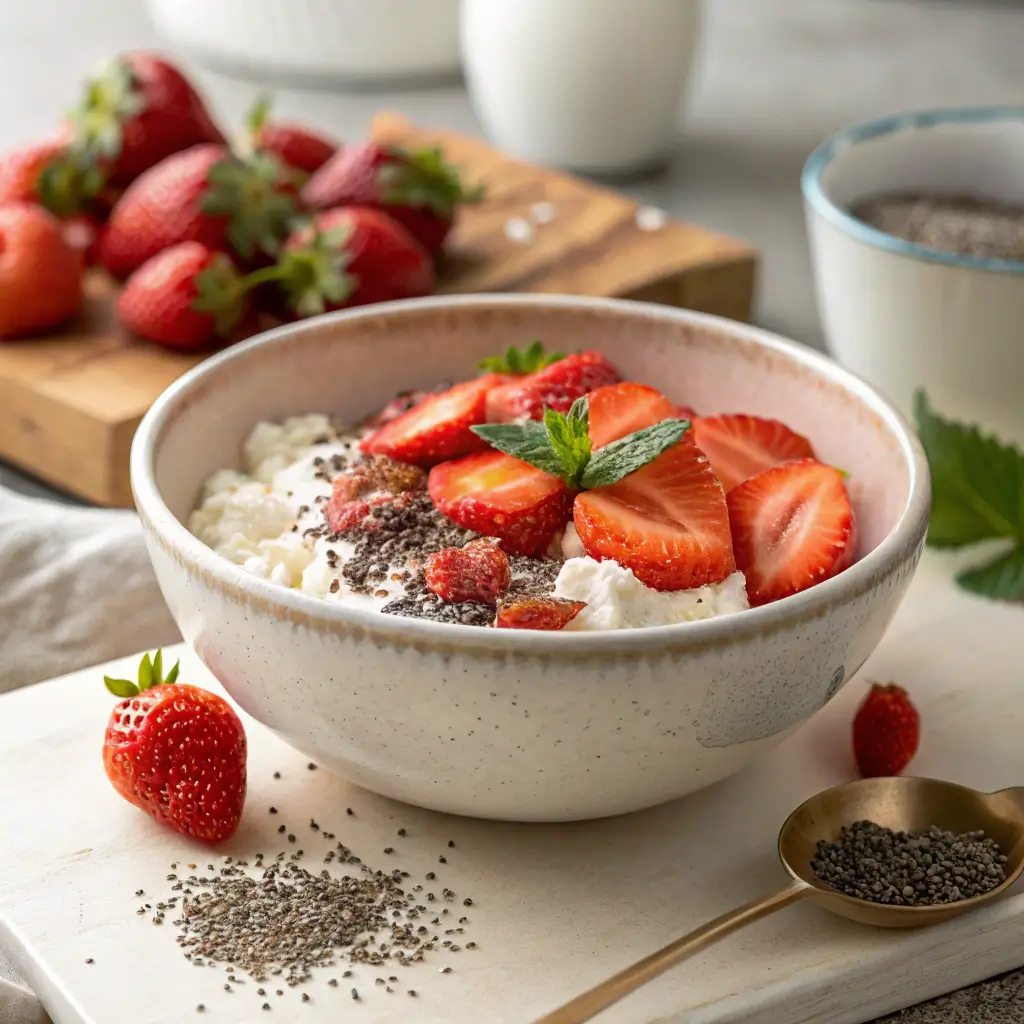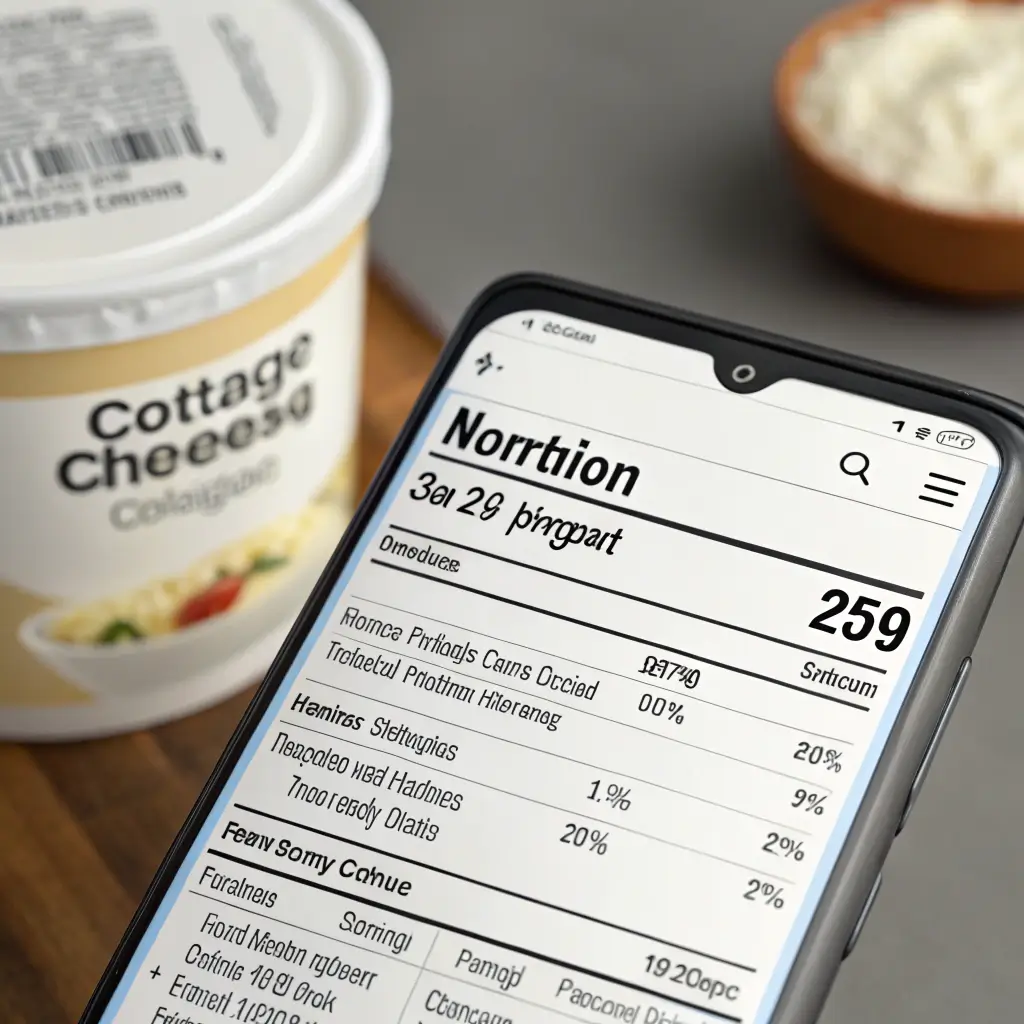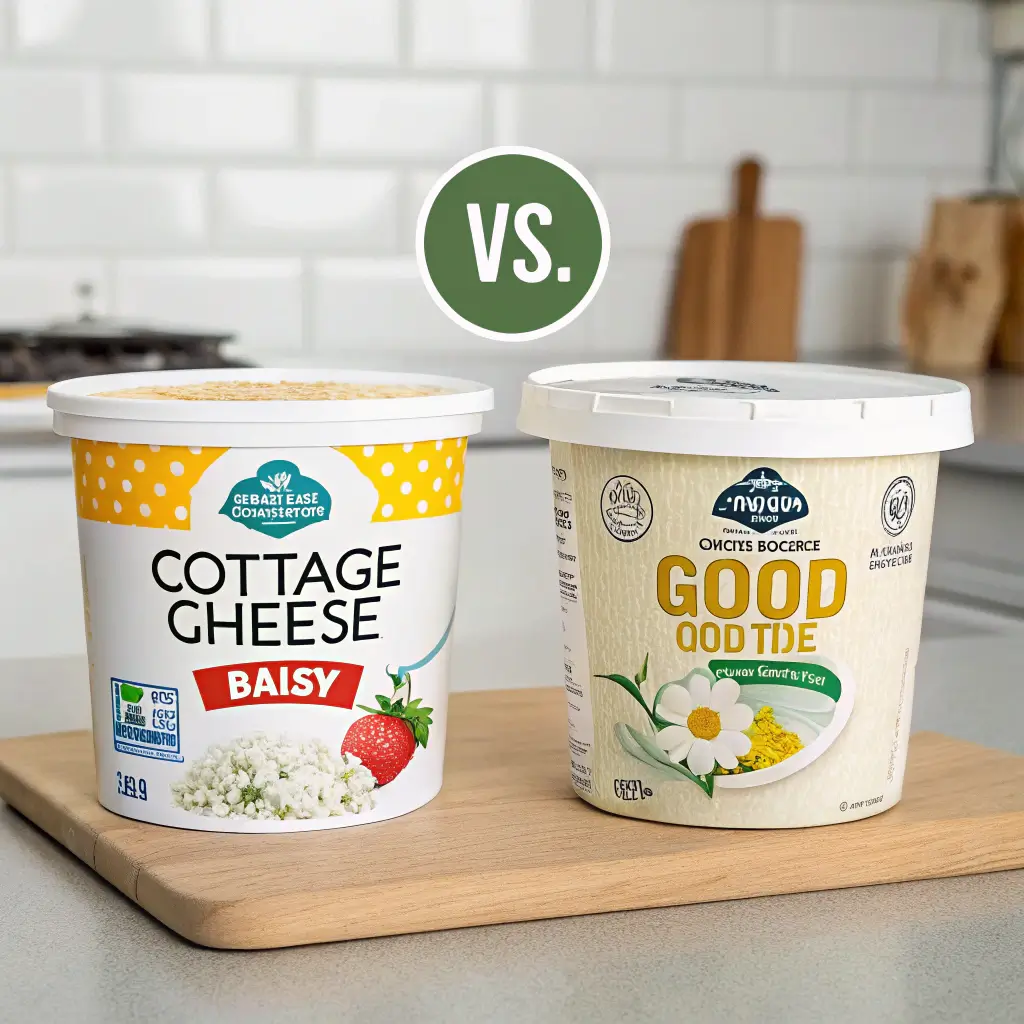
When it comes to healthy eating, cottage cheese nutrition stands out for good reason. It’s a powerhouse of protein, packed with calcium, and incredibly versatile in your kitchen. Whether you’re trying to lose weight, build muscle, or simply want a satisfying snack, cottage cheese offers impressive nutritional benefits with minimal effort.
In this guide, we’ll break down the cottage cheese nutrition label, explore low fat options, compare top brands like Daisy and Good Culture, and show you how to add it to your diet in delicious, easy ways. You’ll also discover why this old-school dairy item is making a serious comeback in 2025 health trends.
Table of Contents
Table of Contents
Understanding Cottage Cheese Nutrition Basics
What Is Cottage Cheese and How It’s Made
Cottage cheese is a fresh cheese known for its soft, creamy texture and subtle tang. It’s made by curdling milk, separating the curds from the whey, and often adding cream or salt afterward. This simple process keeps cottage cheese unaged and full of live, nutritious elements that benefit your health.
Unlike hard cheeses, cottage cheese retains a lot of moisture and offers a much lighter calorie profile, making it ideal for people looking to maintain or lose weight. The size of the curds and fat content can vary depending on the brand and type—ranging from full-fat to non-fat versions.
Here’s a quick table comparing the typical nutrition per 100g of different types of cottage cheese:
| Type | Calories | Protein | Fat | Carbs | Sodium |
|---|---|---|---|---|---|
| Full-fat Cottage Cheese | 100–120 | 11g | 4g | 3g | 350mg |
| Low-fat Cottage Cheese | 80–90 | 12g | 2g | 3g | 400mg |
| Non-fat Cottage Cheese | 70 | 13g | 0g | 4g | 450mg |
Why Cottage Cheese Nutrition Matters in a Balanced Diet
Cottage cheese nutrition facts show it’s one of the most balanced dairy foods available. It contains all three macros—protein, fat, and carbs—in varying amounts, depending on the version you choose. But its true value lies in its high protein-to-calorie ratio, which makes it a top choice for athletes, dieters, and wellness enthusiasts alike.
Here’s what makes it nutritionally important:
- Protein Powerhouse: Each serving contains up to 14g of protein, which is essential for muscle repair, hormonal balance, and satiety.
- Low Sugar Content: Unlike flavored yogurts, cottage cheese contains very low sugar—making it suitable for low-carb diets.
- Calcium-Rich: One cup provides about 20% of your daily calcium needs, vital for bones and teeth.
- Versatile Macronutrient Profile: You can use it in sweet or savory dishes, and it adapts well to keto, paleo, vegetarian, and even diabetic-friendly diets.
Discover great ideas like Cottage Cheese and Jello Recipes Weight Watchers Will Love
Cottage Cheese Nutrition Facts and Label Breakdown

How to Read a Cottage Cheese Nutrition Label
Understanding the cottage cheese nutrition label can help you make better choices depending on your dietary goals—whether it’s building muscle, losing weight, or cutting sodium.
Here’s what you typically find on a standard ½-cup (113g) serving of plain low-fat cottage cheese:
| Nutrient | Amount per ½ cup |
|---|---|
| Calories | 90 |
| Protein | 13g |
| Total Fat | 2g |
| Saturated Fat | 1g |
| Carbohydrates | 3g |
| Sugar | 1g |
| Sodium | 400mg |
| Calcium | 10% DV |
| Vitamin B12 | 15% DV |
Let’s decode what matters:
- Protein: A standout feature—perfect for post-workout recovery and appetite control.
- Fat: Choose the version that matches your goals. Full-fat for flavor, low-fat for calorie control.
- Sodium: This is where many people get surprised. Some cottage cheese products are high in sodium, so always compare labels.
- Calcium & B12: Great for bone strength and brain health—especially important for vegetarians.
You can verify these details by checking the back of the tub. If you’re scanning Good Culture cottage cheese nutrition or Daisy cottage cheese nutrition, you’ll notice slight variations in fat and sodium based on the brand’s formulation.
Check out Aldi’s cottage cheese: Why It’s a Budget-Friendly & Nutritious Choice
Key Nutrients in Cottage Cheese: Protein, Fat, Sodium & More
Protein: The Star Ingredient
Cottage cheese is considered one of the best high-protein dairy options. Depending on the type, it can offer 12–16 grams per serving. This makes it perfect for:
- Fitness lovers
- Weight watchers
- Busy professionals needing a quick, filling snack
It’s a complete protein, meaning it contains all 9 essential amino acids your body needs.
Fat Content: Varies by Type
The fat content can range from 0g in fat-free versions to 4–5g in full-fat types. Fat contributes to taste and helps you feel full longer. If you’re following a low-fat or low-calorie diet, stick to low fat cottage cheese nutrition profiles.
Sodium: Watch the Levels
Most commercial cottage cheese brands contain 300–500mg of sodium per serving. If you’re watching your salt intake, opt for low-sodium or no-salt-added varieties.
Vitamins and Minerals
Besides protein, it’s a good source of:
- Calcium (strong bones)
- Vitamin B12 (brain function, red blood cells)
- Phosphorus (energy metabolism)
Learn more about Specialty Cottage Cheese Uses
Low Fat Cottage Cheese Nutrition: A Lighter Alternative
Nutritional Information of Low Fat Cottage Cheese
When choosing healthier dairy options, low fat cottage cheese nutrition hits the sweet spot. It offers the protein you need without the extra calories from fat. Here’s what you’ll find in a typical ½-cup serving:
| Nutrient | Amount |
|---|---|
| Calories | 80–90 |
| Protein | 12–14g |
| Total Fat | 1–2g |
| Saturated Fat | 0.5g |
| Carbohydrates | 2–3g |
| Sugar | 1g |
| Sodium | 400–450mg |
This lighter version is perfect for:
- Weight management
- High-protein, low-calorie diets
- Those watching saturated fat intake
If you’re searching for nutritional information low fat cottage cheese, always check the brand’s label as sodium and texture can vary widely.
Comparing Regular vs. Low Fat Cottage Cheese
So how does low-fat stack up to regular?
| Category | Regular Cottage Cheese | Low Fat Cottage Cheese |
|---|---|---|
| Calories | 100–120 | 80–90 |
| Protein | 11–13g | 12–14g |
| Total Fat | 4–5g | 1–2g |
| Flavor | Rich & creamy | Lighter, less creamy |
| Satiety | Longer-lasting | May feel less filling |
Conclusion: If you’re trying to cut calories or fat, go with low fat. If you prioritize creaminess and a richer taste, full-fat may suit you better.
Don’t miss our Lactose Free Cottage Cheese
Popular Brands and Their Nutritional Profiles

Good Culture Cottage Cheese Nutrition Overview
Good Culture has become a standout in the health food space. Their cottage cheese is organic, pasture-raised, and available in various fat levels. Here’s a snapshot of their low fat version:
| Serving Size | ½ cup |
|---|---|
| Calories | 120 |
| Protein | 14g |
| Total Fat | 4g |
| Sugar | 2g |
| Sodium | 380mg |
| Live Cultures | Yes |
Why people love it:
- No gums or artificial thickeners
- Contains live probiotics
- Organic, grass-fed milk
Good Culture cottage cheese nutrition is ideal for clean eaters who value simple ingredients with powerful impact.
Daisy Cottage Cheese Nutrition Compared to Others
Daisy is a traditional favorite—creamy, no-frills, and widely available. Their low-fat option includes:
| Serving Size | ½ cup |
|---|---|
| Calories | 90 |
| Protein | 13g |
| Total Fat | 2g |
| Sugar | 2g |
| Sodium | 430mg |
Daisy cottage cheese nutrition is known for its smooth texture and taste, even with lower fat. It’s budget-friendly and a go-to for many households.
Cottage Cheese for Weight Loss and Muscle Building
How Cottage Cheese Supports Weight Loss Goals
If you’re looking for a fat-burning snack, cottage cheese should be on your radar. Here’s why:
- High in protein, low in carbs
- Keeps you full longer, reducing late-night cravings
- Supports lean muscle retention while losing fat
Studies show that high-protein snacks like cottage cheese can improve metabolism and control appetite better than sugary foods.
Cottage Cheese as a High-Protein Muscle Recovery Food
Athletes love cottage cheese because it contains casein protein, which digests slowly. This makes it perfect before bed or after workouts.
- Casein slowly releases amino acids into the bloodstream
- Prevents muscle breakdown overnight
- Aids in faster muscle recovery and growth
Pair it with fruit or oats for a complete post-workout snack.
Learn more about Specialty Cottage Cheese Uses
Cottage Cheese in Special Diets
Is Cottage Cheese Keto-Friendly or Low-Carb?
Yes—cottage cheese nutrition fits perfectly in a low-carb or keto lifestyle, especially if you choose full-fat or low-sugar varieties.
| Keto Criteria | Cottage Cheese (½ cup) |
|---|---|
| Net Carbs | 2–3g |
| Fat (Full-Fat) | 4–5g |
| Protein | 12–14g |
| Sugar | 1g |
Tips for Keto Users:
- Mix with almond butter for a fat boost
- Avoid flavored versions with added sugars
- Pair with seeds or avocado for a balanced fat-protein snack
Using Cottage Cheese in Vegetarian or High-Protein Diets
Vegetarians need reliable sources of complete protein, and cottage cheese is one of the best. It’s rich in B12, calcium, and protein, all without meat.
In high-protein diets:
- Use it as a base for spreads, dips, or pancakes
- Add it to smoothies for creamy texture and protein
- Mix into eggs, lasagna, or low-carb crusts
It’s versatile, nutritious, and supports a range of dietary goals without compromising flavor.
How to Include Cottage Cheese in Your Daily Meals
Best Times to Eat Cottage Cheese for Maximum Benefits
Whether you eat it for breakfast or a late-night snack, cottage cheese nutrition delivers steady fuel thanks to its slow-digesting protein.
Here are the best times to eat it:
- Morning: Boosts metabolism and keeps hunger at bay. Try it with fruit or oats.
- Post-workout: A high-protein boost to help muscles repair.
- Before bed: Casein protein digests slowly, supporting overnight muscle growth.
Eating it strategically throughout the day ensures you’re taking full advantage of its nutrients.
Simple Recipes with Cottage Cheese for Every Meal
Here are quick and easy ways to make cottage cheese a delicious part of your day:
| Meal | Recipe Idea |
|---|---|
| Breakfast | Cottage cheese with berries, cinnamon, and chia seeds |
| Snack | Scoop with cucumber slices or bell peppers |
| Lunch | Mix with avocado on whole grain toast |
| Dinner | Blend into mashed potatoes or add to veggie lasagna |
| Dessert | Blend with cocoa powder and stevia for chocolate mousse |
Don’t miss our Cottage Cheese and Jello Recipes Weight Watchers Will Love
PART 8: Risks, Intolerances, and Who Should Avoid It
Lactose Intolerance and Cottage Cheese
While it’s lower in lactose than milk, cottage cheese still contains enough to cause discomfort in some people.
Tips if you’re sensitive:
- Try lactose-free cottage cheese
- Stick to aged cheeses, which are lower in lactose
- Monitor portion size to reduce symptoms
Learn more about Lactose Free Cottage Cheese
Sodium Content and Heart Health Considerations
One downside of cottage cheese nutrition is the high sodium in some brands—often up to 450mg per serving.
What to do:
- Look for “low sodium” or “no salt added” labels
- Rinse your cottage cheese briefly before eating to reduce salt
- Check your daily sodium intake if you have blood pressure issues
While it’s nutrient-rich, moderation is key for anyone watching sodium or dairy intake.
FAQs :
How healthy is cottage cheese for you?
Cottage cheese is extremely healthy. It’s high in protein, low in sugar, and rich in calcium and B12. It supports muscle growth, bone health, and weight control, making it one of the most nutritious dairy options available.
Is cottage cheese a carb or protein?
It’s primarily a protein food. A ½ cup contains around 12–14g of protein and only 2–3g of carbohydrates, making it ideal for high-protein, low-carb diets like keto or paleo.
Is cottage cheese healthier than yogurt?
It depends on your goals. Cottage cheese typically has more protein and less sugar than most yogurts. However, Greek yogurt may have more probiotics. If you’re focusing on muscle building or weight loss, cottage cheese is often the better pick.
Can we eat cottage cheese daily?
Absolutely. You can safely eat cottage cheese every day, especially low fat or reduced-sodium versions. It’s a versatile, filling food that fits into breakfast, snacks, or meals. Just watch your sodium intake and lactose tolerance.
Conclusion
Cottage cheese nutrition makes it one of the most versatile and powerful foods in a healthy diet. It’s rich in protein, low in sugar, and adaptable for various diets like keto, low-carb, and vegetarian.
Whether you’re diving into low fat cottage cheese nutrition, exploring brand comparisons like Good Culture vs. Daisy, or simply looking for ways to add more protein to your day, this dairy staple has you covered.
For more recipes, follow us on Facebook.
Print
Cottage Cheese Nutrition: The Ultimate Guide to Benefits, Labels & Healthy Uses
- Total Time: 5 minutes
- Yield: 1 serving
- Diet: Vegetarian
Description
Explore why cottage cheese nutrition makes it a powerhouse for health—packed with protein, calcium, and perfect for any diet, from keto to vegetarian.
Ingredients
- 1 cup low-fat cottage cheese
- Optional: fresh fruit, vegetables, or seasonings for serving
- Check label for sodium and fat levels
- Choose between full-fat, low-fat, or non-fat versions
Instructions
- Select your preferred type: full-fat, low-fat, or non-fat.
- Read the nutrition label to check protein, fat, sodium, and sugar contents.
- Eat it as a snack, mix with fruit for breakfast, or use it in savory meals.
- Use it post-workout, in high-protein recipes, or as a bedtime snack for muscle recovery.
- Opt for low-sodium or lactose-free options if needed.
- Incorporate into pancakes, dips, smoothies, or on toast for variety.
Notes
Great for weight loss, muscle recovery, and special diets. Adjust portion sizes and versions based on your dietary needs.
- Prep Time: 5 minutes
- Cook Time: 0 minutes
- Category: Healthy Snack
- Method: No-Cook
- Cuisine: American
